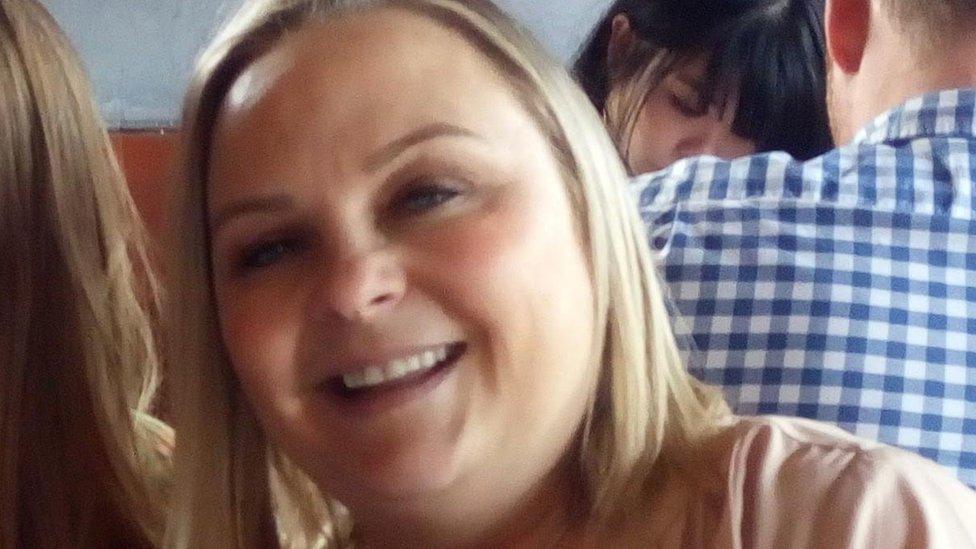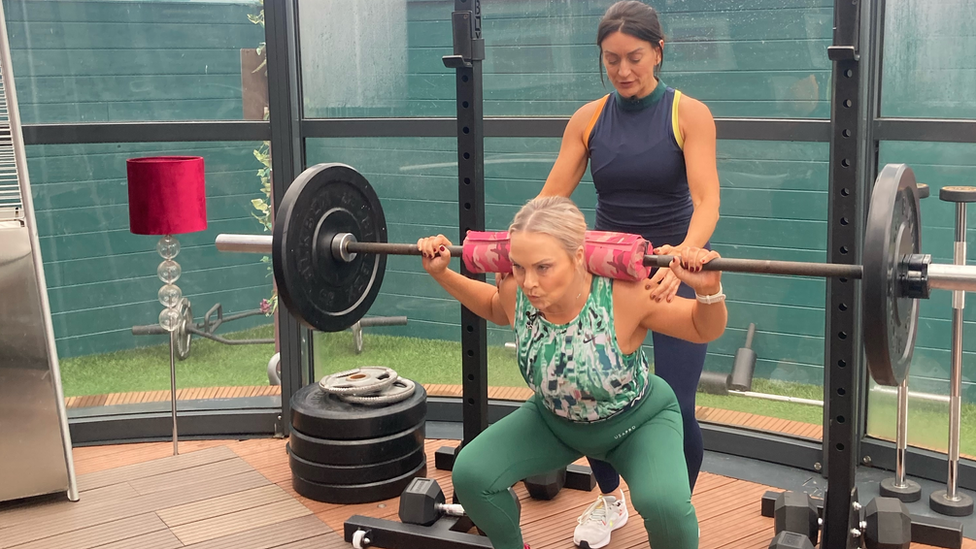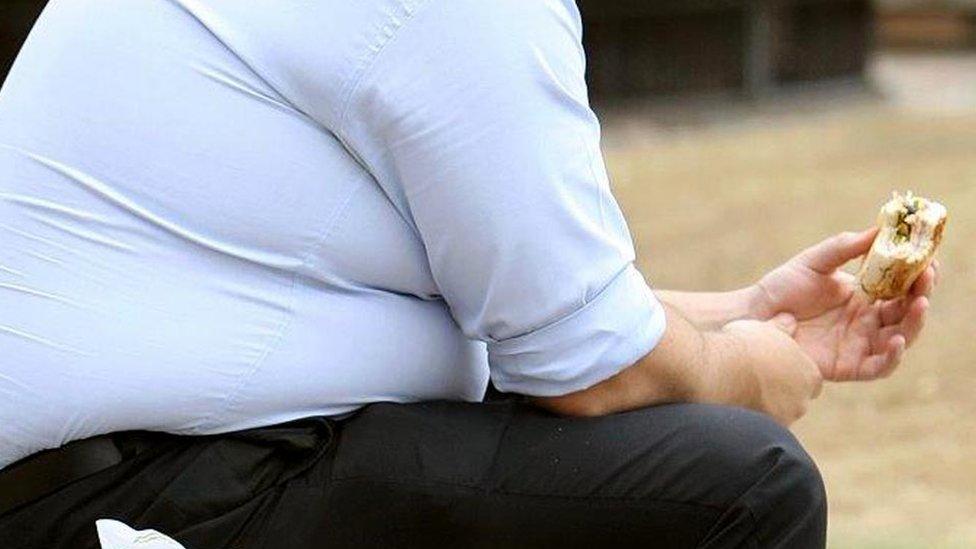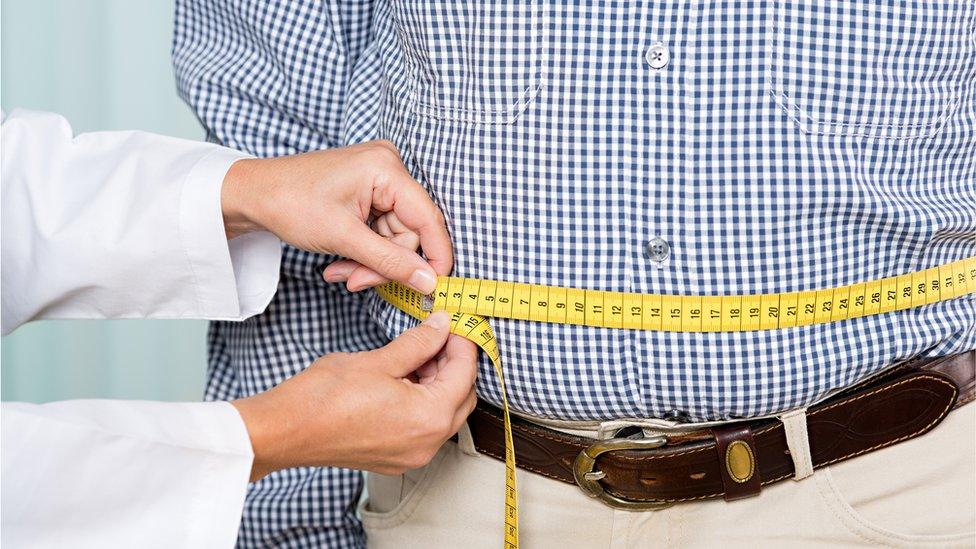Obesity: 'Heart attack and cancer diagnosis was a wake-up call'
- Published
Nikki Girvan from Newry had a heart attack when she was 45
A woman who survived a heart attack aged 45 has said it was a wake-up call to lose weight and make lifestyle changes.
Within weeks of having a stent inserted, Nikki Girvan from Newry, County Down, was also diagnosed with blood cancer.
"At that point, I began thinking of my own mortality and that I could have died," she told BBC News NI.
In Northern Ireland, 27% of adults are obese, according to official figures.
The Public Health Agency says a further 38% of adults are overweight.
It is a startling figure, Dr Nicola Johnston, a consultant cardiologist at the Belfast Health and Social Care Trust, told BBC News NI.
According to Chest, Heart and Stroke NI (NICHS), women in Northern Ireland are twice as likely to die from heart disease, external than breast, cervical, endometrial and cervical cancers combined.
But Dr Johnston said heart attacks were under-recognised in women.

Nikki Girvan before she made drastic lifestyle changes
In June 2019, on a return train from Dublin, Nikki became unwell and her colleagues phoned an ambulance to meet her in Newry.
"I was sweating profusely, having trouble breathing and had pain down my left arm," she said.
"I knew something was seriously wrong. I was blue-lighted to Daisy Hill Hospital then transferred to Craigavon Area Hospital for heart surgery."
Despite a heart attack and blood cancer diagnosis, it took another few months for Nikki to ask for help.
"During Covid, and after the first lockdown, my weight spiralled out of control with eating and drinking and no exercise," she said.
"Then I thought: 'My goodness, look at yourself, you really need to do something about this.' But it was difficult, as when the mood is low you tend to overeat and drink.
"I'd become socially reclusive, I couldn't find anything to fit me, and I didn't want to go out."
But she turned her life around, making healthier food and drink choices, and exercise became "my thing", with the support of a personal trainer.
She said that, eventually, thinking about her health issues "was the wake-up call I needed".
"I am a single mum with a full-time job, my son needs me, and I have to take care of him," she added.

With the help of a personal trainer, Nikki said her diet and lifestyle were turned upside down
Now Nikki is enjoying life, and is in a healthier place mentally and physically.
"I am full of energy and playing football with my son," she said.
"I am not breathless and my cholesterol is back to normal. I'm off the statin medication and my blood cancer is under control with treatment.
"My advice to other women is: 'You can do it and take action now.'"

Nikki completed the Seven Peaks Challenge
According to Dr Johnston, the NHS needs to see more people like Nikki taking ownership of their health to help themselves and the health service.
She said statistics show that obesity is becoming an "increasingly difficult problem" with over half of the population being overweight.
"Obesity can increase the risk of many health conditions including heart attacks, heart failure, stroke, diabetes and respiratory conditions.
"There is an increased risk of breast and bowel cancers, and it affects mental health too," Dr Johnston said.
'Little steps'
Personal trainer Geraldine McAleenan, who specialises in women's health, said since the Covid-19 lockdown, she had been training more women like Nikki who want to shift the extra pounds gained.
She said two factors that often affect weight gain were overeating and lack of sleep.
Her message is to take "little steps, including leaving the front door to walk for 10 minutes then walk 10 minutes back and that for most people can be the start of a weight-loss journey".
"Additional weight around the tummy breeds inflammation around the organs which slows everything down," she added.
"You can see a big increase in people carrying weight around the stomach which impacts on the organs especially the heart, liver kidneys bones and joints.
"As well as physically, it also affects the mood, sleep and people take time off work sick and just don't want to leave the house."
Related topics
- Published1 November 2018

- Published17 April 2019

- Published4 June 2021
